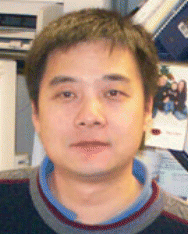CB&DD Editorial Advisory Board (Fifteenth in series)
This special section of CB&DD will regularly list individuals from academia, government, and industry worldwide who are promoting the advancement of science, technology, and medicine with respect to their focus on the multidisciplinary fields of chemical biology and drug design. In this issue, please find a listing of several members of the CB&DD Editorial Advisory Board, including Brendan Gilmore, Chester Metcalf III, Yuan-Hua Ding and Thomas Gardella.
Brendan Gilmore Ph.D. Editorial Advisory Board,Chemical Biology & Drug DesignLecturer in PharmaceuticsQueen's University BelfastNorthern Ireland

Biographic abstract: Brendan received a BSc in Pharmacy and a PhD in Biomedicinal Chemistry from Queen's University Belfast after a period of postdoctoral research in the Biomolecular Sciences group. In 2001, he was appointed to a lectureship in Pharmaceutics at the School of Pharmacy, QUB, where he joined the Biomaterials & Drug Delivery group. He has also been a visiting scientist at the University of Calgary, Biofilm Research Group led by Professor Howard Ceri. Brendan's major research interests include the development of inhibitors for the serine, cysteine, and metalloproteases, development of affinity-based probes for the serine proteases (including the proline-specific peptidases dipeptidyl peptidase IV and FAP), the identification and inhibition of proteases involved in biofilm formation at biomaterial surfaces and the synthesis and evaluation of antibiofilm properties of antimicrobial peptides. Brendan is also involved in the development of novel drug delivery strategies which rely on protease-mediated release from biomaterials. Brendan has authored over 20 publications, including recent examples in Biochem Biophys Res Commun and Chem Biol Drug Des.
Chester Metcalf III Ph.D. Editorial Advisory Board,Chemical Biology & Drug DesignSenior Director, Medicinal ChemistryCubist Pharmaceuticals

Biographic abstract:Chet received his BSc in Chemistry (Summa Cum Laude) in 1987 from Wayne State University and then went on to receive his MSc and PhD from Yale University in the lab of Professor Frederick E. Ziegler. While at Yale, he completed the first total synthesis of the trichothecene mycotoxin, sporol. In 1992, he joined ARIAD Pharmaceuticals, where his research focused on lead discovery, structure-based drug design, and traditional medicinal chemistry lead optimization for small molecule therapeutics in oncology, bone disease, and inflammation. Chet has over 14 years of industrial experience and has been instrumental in the discovery and development of several lead compounds, including a novel mTOR inhibitor, AP23573, which has been studied in multiple Phase 2 and 1b clinical trials. In addition, he has co-authored over 50 publications and patent applications, including seven issued patents. Currently, Chet is head of the Medicinal Chemistry at Cubist Pharmaceuticals, as Senior Director, working in the therapeutic field of anti-infectives.
Yuan-Hua Ding Ph.D. Editorial Advisory Board,Chemical Biology & Drug DesignSenior Principal ScientistHead, Structural BiologyResearch Technology CenterPfizer Global Research & Development

Biographic abstract: Yuan-Hua Ding received his BSc in Electronic Physics from Peking University (1987), a MSc in Biophysics (1990) from Tsinghua University and a PhD in Biochemistry from University of Pittsburgh (1996). He was a postdoctoral fellow in Professor Don Wiley's Lab at Harvard University where he investigated structural and molecular mechanisms of immune recognition involving T-cell receptor and major histocompatibility complexes. He also collaborated with Dr Jodah Folkman of Boston Children's Hospital on the structure and function of Endostatin, a angiogenic inhibitor. In 1999, Yuan-Hua joined the newly established Pfizer's Research Technology Center in Cambridge, Massachusetts and has since led the establishment of a state-of-the-art facility that employs new automation technology (Fluidigm, Cartesian, Tecan, and Robodesign) and database management system (Rockmaker) for high-throughput crystallization and structure-based drug design. His group supports a portfolio of about 10 programmes through collaborative effort between the Pfizer Research Technology Center and a number of Pfizer global structural biology groups as well as therapeutic area project teams, including oncology, diabetes, inflammation, and CNS drug discovery. His research interests focus on protein folding, structure, and function and applications to drug design. Yuan-Hua is a co-founder and secretary of the New England Structural Biology Association (http://www.nesba.net). He is also a member of the Executive Committee, Sino-American American Pharmaceutical Professionals Association-New England (SAPA-NE).
Thomas Gardella Ph.D. Editorial Advisory Board,Chemical Biology & Drug Design Associate Professor of MedicineEndocrine UnitMassachusetts General Hospital

Biographic abstract: Dr Thomas J. Gardella is an Associate Professor of Medicine at the Massachusetts General Hospital, Boston, Massachusetts and has been a member of the M.G.H. Endocrine Unit since 1988. He received his PhD in Molecular Genetics from the University of Massachusetts Medical School, Worcester, MA, in 1988, and a BSc in Biochemistry from the University of Massachusetts, Amherst, MA in 1979. He has a long-standing interest in peptide hormones and G protein-coupled receptors, and, in particular, PTH and the PTH receptor system. His research focuses on the mechanisms by which these molecules interact and activate downstream signaling cascades. His work has led to a variety of new minimized PTH analogues for the PTH receptor, and these could pave the way for designing new PTH receptor ligands, peptidic or non-peptidic, that could be used to treat diseases such as osteoporosis.




